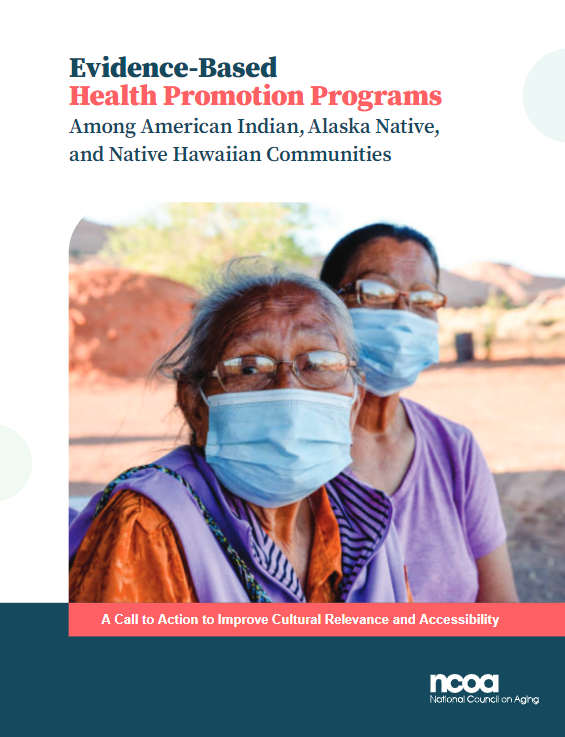The National Council on Aging has created Evidence-Based Health Promotion Programs Among American Indian, Alaska Native, and Native Hawaiian Communities. To download and view click here.
The report, Evidence-Based Health Promotion Programs Among American Indian, Alaska Native,and Native Hawaiian Communities: A Call to Action to Improve Cultural Relevance and Accessibility provides important information about evidence-based health promotion and disease prevention programs in American Indian, Alaska Native, and Native Hawaiian (AI/AN/NH) communities.
This report highlights the:
- Unique disparities in health care access that AI/AN/NH communities face;
- Diversity of services supported by the Older American Act in AI/AN/NH communities, such as nutrition, transportation, caregiver programs, information and referral, and health promotion;
- Current evidence-base for, availability, and acceptability of health promotion programs in AI/AN/NH communities;
- Experience of program administrators in AI/AN/NH communities, and perspectives from elders about what aging well means to them and the extent to which they are aware of and/or have been involved with health promotion and disease prevention programs;
- Results from a survey of Older Americans Act Title VI Directors and Staff, providing information about their experience with health promotion and disease prevention programs, the unique challenges they face in serving their communities, and what resources they think might help; and
- Potential next steps to advance the health and well-being of AI/AN/NH elders.
Selected findings:
- 52% of Tribal Title VI directors said Alzheimer’s / dementia is one of the greatest health and wellness needs in their community; No 1 was diabetes.
- The top 2 program activities elders are most interested in according to Title VI directors are focused on 1) cultural activities and 2) socialization.
- Transportation is the No 1 reason elders withdraw from programs.
- Funding is the No 1 resource needed to support implementation of evidence-based interventions.
- Additional themes to support local implementation include: engaging elders, leadership and others in the community in intervention selection and marketing to enhance uptake and ownership; additional consistent training and resources (beyond funding) to support implementation; and culturally appropriate marketing materials and interventions.
To learn more download and view the full report by clicking here.

